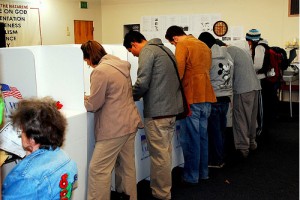 Barry’s Blog has a post on the consequences of the election, anticipating Republican gains in the House and likely control of the Senate, calling the post ‘What Tomorrow’s Election Means for the Nonprofit Arts.’ Good question! He writes:
Barry’s Blog has a post on the consequences of the election, anticipating Republican gains in the House and likely control of the Senate, calling the post ‘What Tomorrow’s Election Means for the Nonprofit Arts.’ Good question! He writes:
On the federal level, if the Democrats maintain control of the Senate, this election probably won’t mean much for us at all. If, though, the Republicans capture the Senate, as is widely being predicted, then we are likely to once again face challenges to funding to the NEA and the NEH (and maybe PBS too), and quite possibly another round where proposed cuts are the best case scenario, and elimination may be on the table. One hopes not, but reality suggests otherwise. Gridlock may well be inevitable. The threat of a presidential veto will come into play, and the President may well use his power of executive order to move his agenda. That will bring cries of ‘foul’ from the Republicans and again we may have stalemated government.
He advises after the election, regardless of the outcome, that every arts advocate …
Write a letter (ONE letter) congratulating the elected official on their victory (first time or re-election) stating that you (and / or your organization) reside in the elected official’s district, and then outline the value of the arts in your district, including some data and study references (nothing that has to be too complicated – two or three bullet points ought to suffice), include a story about some real, live person positively impacted by the arts in your area, and finish by urging the elected official to meet with you so you can share with them why the arts are essential to his / her constituents.
Let me suggest a different take.
Do elections matter for the arts in the US? Absolutely. The cultural world of creators and audiences is heavily influenced by public policy, and the Republicans and Democrats have markedly different positions on the key issues. But public funding for the arts, and the budgets of the NEA and of state arts agencies, are not the main policies that affect the arts. The Affordable Care Act has a much larger impact on artists and the country they live and work in. Education policy, including Common Core and policies for evaluating school progress and teacher effectiveness, and unequal school budgets, has an extremely important effect on the long run health of culture in the US, far more than the budgets of granting agencies. And that’s just a beginning. I support sound and stable funding for federal and state arts agencies. But in this election, they are not the major issues facing the future of the arts.
UPDATE: From the Times, November 4 (really!):
Playwrights may deliver the essential ingredient for any theater production — the script — but they are often the only people on the artistic team who go unpaid during casting auditions and rehearsals for their shows, and they usually fend for themselves with health insurance, too. But one major Off Broadway theater company is changing that, aiming to offer a model for compensation after years of national debate about ways to help often struggling playwrights.
The company, Playwrights Horizons, announced on Tuesday that it has started covering roughly 50 percent of the health care premiums for its writers during the season in which their works are produced.
Hmm, in Canada, and in other countries, nonprofit theatre companies don’t have to dig up funds to help playwrights cover their health insurance…
UPDATE (November 10): From Barry’s Blog:
While I agree with Professor Rushton that the issues of health care, education and many others are critically important to the future of the arts, I disagree that the funding mechanism (let alone the existence) of the NEA is not equally important to our future. I suppose what anyone thinks is important to our future depends on whom you are talking to, and what they do. But in the big picture, any attack on the arts, like the attacks on the funding level, or even very existence of the Endowment, go towards marginalizing and diminishing the value of the arts in the public mindset. And that marginalization or devaluation impacts everything that might be important to our future, including our success in education policy that frames the arts, and in health care for artists.
Great post, recommend reading the whole thing.

Leave a Reply